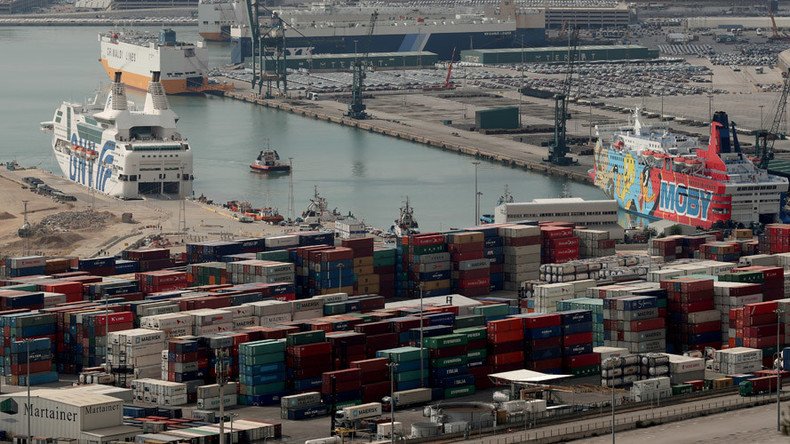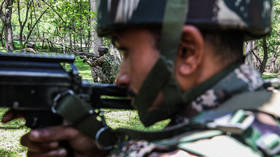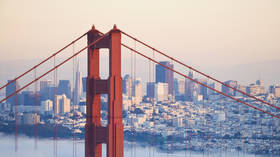‘Repression ships’: Catalonia dockworkers refuse to serve Madrid police vessels

Madrid has rented three commercial cruisers for police forces sent in as reinforcements to Catalonia, which has been gearing up for an independence referendum. But Catalan dock workers are refusing to serve the vessels “in defense of civil rights.”
"Three ships arrived and will stay in the ports of Barcelona and Tarragona, where police and Guardia Civil forces will stay," AFP cited an unnamed source at the representative office of the central government in Catalonia.
Early Thursday, the ‘Rhapsody’ docked in a terminal in Barcelona, with another vessel, the ‘Moby Dada,’ anchored later in the day. The ‘Azzura’ also arrived in a Tarragona harbor, about 100km away from the Catalan capital. With the capacity of the ‘Rhapsody’ is 2,500 passengers alone, the three vessels combined are said to be able to carry up to 6,600 people.
The fourth vessel was supposed to dock in the port of Palamos, however it was denied access by the Catalan authorities, since the port is administered by the regional government. In the meantime, three others were allowed to moor until October 5, under a ministerial order. Their arrival came as a surprise, as the notifications arrived just minutes in advance.
The cruisers’ arrival follows massive protests which saw thousands take to the streets for two days straight, demonstrating against the arrest of senior officials in police raids during the referendum preparations. In police raids on Wednesday, 14 people, including high-ranking officials, were detained. In addition, police seized nearly 10 million ballots and 45,000 envelopes, intended to notify voters about the referendum, deemed unconstitutional by Madrid. The region’s leader, Carles Puigdemont, declared that the vote scheduled for October 1 would go ahead despite efforts by the Spanish state “to prevent Catalans voting.”
In defiance, the Catalan dockworkers decided to stand up for “civil rights defense.” Deriding the cruisers as “repression ships,” the Organization of Port Workers of Barcelona (OEPB) announced they wouldn’t serve the vessels.
.@govern Reunidos en asamblea, los estibadores de BCN hemos decidido en votación no operar buque Raphsody. En defensa derechos civiles
— OEPB (@CoordinadoraBCN) September 21, 2017
“As long as this exceptional situation lasts, we will not attend the ships that are selected to respond to this situation,” the OEPB’s secretary, Josep Maria Beot, said, as cited by El Diario. Stevedores in Tarranoga also supported the move.
"Many civil rights are being violated, and as stevedores we are affected," Gabriel Jimenez, a member of the OEPB, said, El Pais reported. So far, the ships have not requested any service, which Jimenez says is unusual for such large vessels.
The decision to house hundreds of law enforcement agents aboard the boats came last Monday, as the Interior Ministry faces strained accommodation options in Catalonia, high prices and public pressure from locals who live near the forces already deployed in the region.
The central government is planning to increase the police and National Guard presence in the region to more than 16,000 officers by the October 1 secession vote, according to El Pais.
On Friday, the Interior Ministry also said it was sending further police forces, without detailing the exact number.
Enviamos unidades de refuerzo de @guardiacivil y @policia a Cataluña para colaborar con los @mossos en el mantenimiento del orden público.
— Juan Ignacio Zoido (@zoidoJI) September 22, 2017
"They will be tasked with surveillance of public space and maintaining order and they will act in case the illegal referendum is maintained," Reuters cited a ministry statement as saying.












